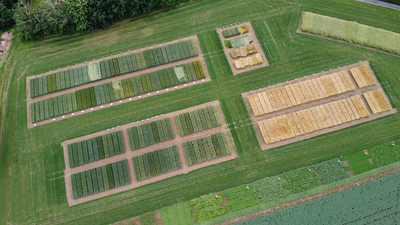
Agriculture is facing challenges that are immense: The limited resource of soil, reduced fertilisation, dimishing availability of funds in crop protection, climate change with heavy rain and drought and thus increased disease and pest pressure. How can farms still operate economically and at the same time participate in the further development of climate and environmental goals? Deutsche Saatveredelung AG (DSV) offers the agricultural sector possible solutions, which were presented at a press briefing in Leutewitz near Dresden, Germany.
Plant breeding is needed more than ever to provide answers for sustainable and high-yielding crop rotations. This is also called for in the discussion paper on the Arable Crop Strategy 2035 of the German Federal Ministry of Food and Agriculture (BMEL). "However, this cannot be done overnight, because variety breeding and the establishment of functioning crop rotation systems are a lengthy process", says Dr. Eike Hupe, member of the DSV Board of Management, in conversation with press representatives. As an example, he mentions the new winter barley varieties SENSATION and PARADIES from DSV's cereal breeding programme. These are equipped with special resistances, as well as the varieties DAKTARI and SMARAGD from the canola breeding program. These varieties allow the reduction of pesticides at a high yield level - a key in the context of political and environmental demands. Breeding these varieties takes ten to fifteen years. "This is the reason why we demand long-term security and reliable framework conditions from politicians," he emphasises at this point.
Breeding goals such as health, performance, site suitability, nutrient efficiency and quality have long been top priorities for all the crops DSV works on. Grasses, canola, cereals, legumes and catch crops are all in focus here.
However, new crops that increase biodiversity and offer new opportunities are also being considered. For example, white lupin or sorghum. With FRIEDA and CELINA, the new anthracnose-tolerant white lupins from DSV, domestic protein cultivation is being further developed. New sorghum varieties and sorghum mixtures will provide alternatives for forage production.
DSV is a plant breeder, but also sees itself as an innovator in the development of new cultivation systems. Intelligent greening systems perform many functions. They increase biodiversity, protect the soil and promote its fertility. They conserve nutrients, regulate soil temperature, keep water in the system and can provide insect protection. The list of benefits is large and extends to managing the quality of food production and ultimately securing it. This is where knowledge of soil biology, species and crop rotation is needed. "We are a long way from unlocking the potential that lies in the proper management of soil biology", Hupe says.
Environmental protection and sustainable arable farming are compatible in his view.
„DSV began developing alternative cropping practices shortly after its founding in 1923. "For example, to produce our grasses, we looked for ways to do it more economically - and that's when the undersowing technique was born," Hupe explains. "Undersowing, because of its many positive effects - nutrient conservation, erosion control, soil cover, etc. - it is already impossible to imagine life without them. Here we are working intensively on new effective plant combinations for a wide variety of main crops."
Protecting the soil, increasing humus content, promoting soil life - this is also what the TerraLife® brand program has stood for now for 10 years. "We are continuously developing the program: from a pure intercropping program to complete greening systems," explains the DSV board member. There are also new rapeseed companion crops (BrassicaPro).
In order to protect the scarce resource of soil, high yields will continue to be required in all areas in the future, including forage production. As a forage grass breeder, the focus in variety development is also on health, nutrient efficiency, performance and digestibility. The COUNTRY mix program is designed on this basis and has now been expanded to include particularly species-rich mixes. In forage production, legumes, which bring nitrogen from the air into the soil system, will become increasingly important in the future.
"The challenges for tomorrow's arable farming are great. We already offer practical systems for farming today - and continue to use all our experience to work out the best solutions for economical and ecological agriculture", says Hupe.

Angelika Hemmers
|
|
+49 2941 296 489 |
|---|---|
|
|
+49 2941 296 8489 |
|
|
angelika.hemmers@dsv-saaten.de |